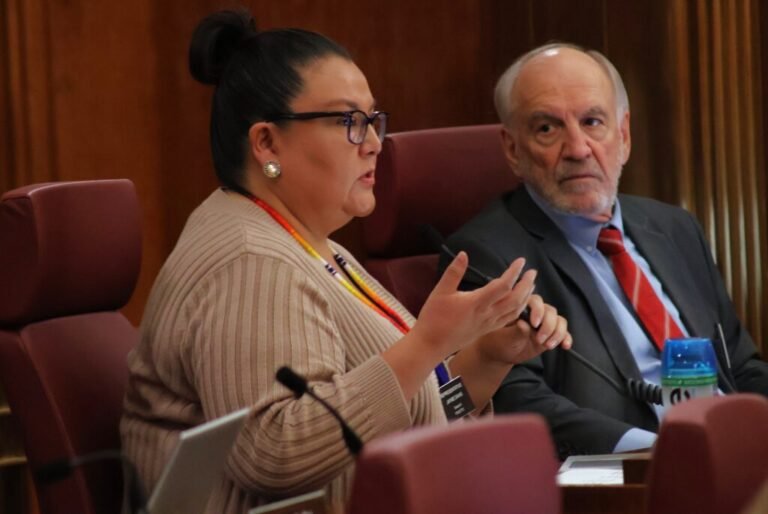Rep. Jayme Davis, D-Rolette, speaks during a committee meeting on Oct. 15, 2025. At right is Sen. Tim Mathern, D-Fargo. (Photo by Michael Achterling/North Dakota Monitor)
A committee of North Dakota lawmakers did not support a proposal this week that sought to guarantee at least 5% of federal rural health care funding go to the state’s tribal communities.
The state is drafting an application for $500 million in federal funding for rural health care in North Dakota that will be distributed over the next five years. North Dakota also is vying for additional funds.
Rep. Jayme Davis, a Democrat from Rollette, advocated during a committee meeting Tuesday for a motion that would have required 5% of that be allocated to tribal nations in the state each year. Davis, a citizen of the Turtle Mountain Band of Chippewa, said the money is meant to address areas with the biggest funding disparities.
“It’s my people who have the biggest disparities in North Dakota,” Davis said.
Davis said she made the proposal in response to a formal resolution passed by chairs of the five tribal nations that share geography with the state. The 5% would be distributed in two ways: 60% equally split among the five tribes and 40% made available for targeted grants for tribal governments, tribal colleges and tribal health organizations.
Davis said she’s worried the funding will be awarded to health care organizations, especially those in larger communities, that already have resources and funding in place.
“When really our rural communities, our tribal communities, really need this money, really need these funds to make a difference in what this whole thing is for,” Davis said after the meeting. “To address health care in rural America, in rural North Dakota.”
Half a dozen lawmakers voiced concerns about the proposal. Rep. Jon Nelson, a Republican from Rugby, said he hopes the funding distribution will result in more than 5% benefiting tribal members in the state without the need to set aside a certain amount.
“I would be shocked and disappointed if only 5% of the funding would go towards programs that directly and indirectly affect tribes,” Nelson said. “I would think and I would hope and I would guarantee, as much as I have the ability to, that this process will be favorable to tribal communities without a set-aside.”
Sen. David Clemens said he thinks tribes will get their fair share.
“I don’t feel it would be the right thing to allocate a certain amount to a certain segment of our society,” said Clemens, a Republican from West Fargo.
Sarah Aker, executive director of medical services for the Department of Health and Human Services, said allocating a set amount of the federal funding to the tribes would reduce the state’s flexibility in how it is allocated. North Dakota has to submit an application to the federal government by Nov. 5 detailing how the state plans to spend the money received over the next five years. Only limited modifications to the plan can be made once it is approved.
Davis withdrew the motion asking for 5% to be set aside. In its place, Davis asked for tribal applications for grants to be given a 5% weighted increase in the formula evaluating how grants will be awarded.
The committee adjourned without a vote on Davis’ second motion.
The state will receive at least $500 million in federal funds for rural health care over the next five years. Each state is eligible for more funding based on certain state demographics and other criteria.
The process for distributing that funding to organizations in the state has not been finalized. Aker mentioned there will likely be a combination of mechanisms, such as a formal procurement process and awarding grants based on applications, but the department is focused on minimizing any administrative burden for applicants to ensure smaller entities will feel able to apply for funds.
Davis is asking for tribal representation on the committee that decides the grant awards. While Aker said her department has spent time connecting with tribal stakeholders and views the tribes as “partners,” Davis said it is important for a tribal representative to have a voice at the table.
“Nobody knows us better than we know ourselves, and so we’re constantly fighting for that representation,” Davis said. “If I wasn’t in this committee, none of this would have happened…. It might have never even been an afterthought, and our tribes might have missed out on having this opportunity.”
North Dakota Monitor reporter Jacob Orledge can be reached at jorledge@northdakotamonitor.com.
SUPPORT: YOU MAKE OUR WORK POSSIBLE
SUBSCRIBE: GET THE MORNING HEADLINES DELIVERED TO YOUR INBOX

